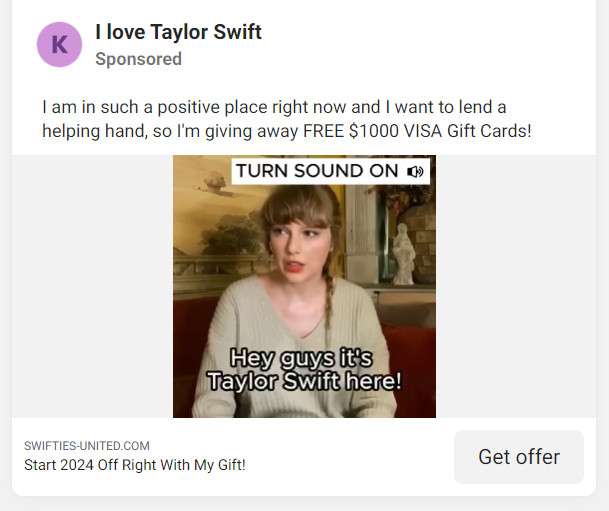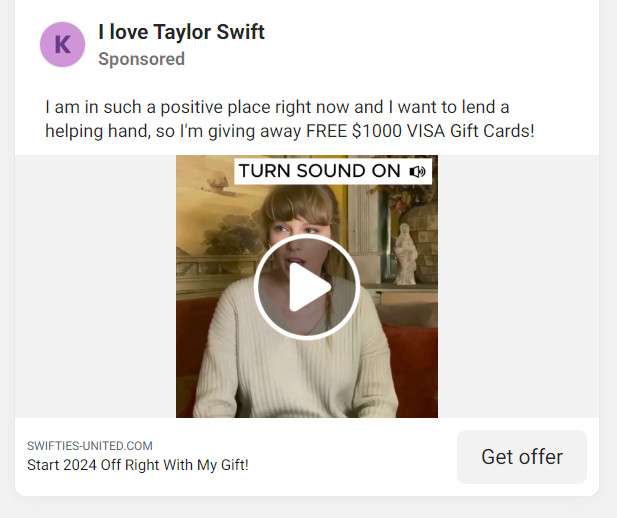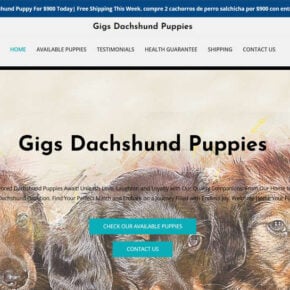A glamorous pop superstar giving away free money to fans? It seems like a Swiftie’s dream come true. But what appears to be Taylor Swift announcing an exciting gift card giveaway is actually a convincing scam designed to prey upon her fans’ trust and enthusiasm.
When a too-good-to-be-true video of Swift pops up in your social media feeds offering $1000 Visa gift cards, resist the urge to click and instead recall the sage advice of Swift herself: “Liars and thieves at my door… I can’t trust them anymore.”
This deepfake hoax has all the hallmarks of a classic scam. Read on to learn how to recognize these deceptive giveaways, protect your hard-earned reputation and money, and avoid becoming ensnared by the “Swift Thieves” lurking on social media. Outsmarting them is a game of strategy that requires fans to approach with caution rather than racing recklessly into free gift offers.

Scam Overview
The Taylor Swift deepfake video scam first started infiltrating the feeds of Swifties in early 2024 The scam takes advantage of fans by using convincing deepfake technology to imitate Swift announcing an exciting giveaway.
The ads appear in Facebook and Instagram feeds, formatted to look like promoted posts. The video thumbnail shows Swift smiling, with text stating “Taylor Swift’s $10000 Visa Card Giveaway!” This immediately catches fans’ attention.

When users click on the video, they see what looks uncannily like Swift speaking directly to her fans. “Hey guys, it’s Taylor Swift here,” the deepfake Swift voice says. “I am in such a positive place right now, and I want to share my good fortune with everyone.”
The AI-generated version of Swift goes on to explain that, since times are so tough, she wants to help fans start 2024 off right. “To do that, I am giving away free $1,000 Visa gift cards to the first 10,000 people that see this video,” she claims enthusiastically.
This elaborate fake gives details of how to take a short qualification survey to secure one of the limited gift cards. “All you have to do is press the ‘Get Offer’ button below,” the eerily convincing Swift decoy instructs.
Of course, this is all an elaborate ruse. The deepfake allows scammers to impersonate Swift’s voice, facial expressions, and speech patterns. But the giveaway is completely fabricated, aimed at deceiving overeager fans into handing over their personal information and money.
The scam video directs users to a website called “Swifties United” to take the promised survey. However, this site was anonymously registered in March 2024. The domain registry information shows the site was created via a registrar based in the Cayman Islands.
This should immediately raise red flags, as Swift would never choose such an obscure site for a major promotion. All of her legitimate announcements happen on her verified social media accounts or through major brand partnerships.
Additionally, the urgent language in the video description and deepfake script aim to pressure fans. “Hurry, supplies are limited!” and “Today only!” create a false sense of scarcity. This tricks fans into clicking without taking time to think through the legitimacy.
In reality, there is no Taylor Swift Visa gift card giveaway. The deceptively realistic deepfake video mimics Swift simply to give scammers access to users’ information and money.
The scam ads often use other deceitful tactics as well. For example, the Facebook pages hosting the ads use names like “Taylor Swift Fans” or “I Love Taylor Swift.” This makes them seem like legitimate fan accounts at first glance.
Some of the pages have photos of Swift, posts about her music, and other fan content. This helps them seem authentic and slip past Facebook’s fraud detection filters.
Scammers go to great lengths to make the offers look valid. The deepfake technology allows them to closely imitate Swift’s voice, expressions, and mannerisms. They create elaborate fake fan pages to link to the ads. And they mirror the urgent, enthusiastic language the real Swift uses to address her fans.
But no matter how convincing the facade, these scams always have telltale signs like sketchy sites, limited-time offers, and requests for personal information. Savvy Swifties can protect themselves by looking for these red flags.
This scam has been also investigated by Jordan Liles on his YouTube channel, where he offers a detailed video on the subject. We recommend watching his content for a comprehensive understanding of the scam.
Next, let’s break down exactly how scammers carry out this scam from start to finish.
How the Scam Works
The Taylor Swift deepfake Visa gift card scam employs some classic techniques to try to hook unsuspecting fans:
1. False Sense of Exclusivity
The ads and fake Swift video emphasize that this is an exclusive opportunity only available to the first 10,000 people. This creates a false sense of urgency and exclusivity that scares people into clicking right away before “missing out.”
2. Request for Personal Information
After clicking the link, users are taken to a survey asking for personal and contact information. The form asks for details like your name, email, phone number, and sometimes even physical address.
3. Subscription Sign-Ups
Often the “survey” will require signing up for suspect free trials or subscriptions in order to qualify for the supposed gift cards. Burying these paid services in the fine print is a common scam tactic.
4. Hidden Fees
Other times, you may be taken to a website offering the “free” gift cards but requiring a small shipping/handling fee. These sites sneakily enroll you in monthly subscription plans without your consent.
5. Legitimate-Looking Deception
The deepfake video and website are designed to look authentic at first glance. The goal is to collect payment details and personal info before people realize it’s a scam.
6. Credit Card Theft
Providing any payment information or clicking suspect links gives scammers access to your financial details. They can rack up fraudulent charges or steal your identity.
This seamless process takes advantage of fans’ excitement over a fake Taylor Swift giveaway to quietly steal personal information and money.
What to Do if You Have Fallen Victim to This Scam
If you clicked on one of the Taylor Swift deepfake gift card scam ads and provided any personal or financial information, take the following steps right away:
- Contact your bank – If you entered any payment information, call your bank and explain you were scammed. They can freeze your account, dispute charges, and monitor for fraud.
- Change passwords – Update any passwords for accounts you may have accessed on the scam site to prevent further access. Make sure passwords are strong and unique for each account.
- Watch for unauthorized charges – Keep a close eye on your financial accounts and credit reports over the next few months for any signs of misuse of your information. Dispute anything suspicious.
- Sign up for credit monitoring – Consider enrolling in identity theft protection services to keep a close watch for scammers opening accounts in your name.
- Beware of recovery scams – Realize that initial scammers will sometimes reach back out posing as investigators to scam you again. Never pay any fees to recover lost money from a scam.
- Report the ad – File a scam report with Facebook, Instagram and other platforms where you saw the video. Also report to the FTC.
- Spread awareness – Let other fans know on social media about the scam so they don’t also get tricked. Help cut off the scammers’ access to potential victims.
With swift action, you can limit the damage from any personal details you provided to these scammers. But you need to move quickly in order to protect yourself from identity theft or financial fraud.
Frequently Asked Questions About the Taylor Swift Deepfake Visa Gift Card Scam
1. What is the Taylor Swift deepfake visa gift card scam?
The Taylor Swift deepfake visa gift card scam is a fraudulent promotion being spread on social media using a doctored video of Swift announcing a $1,000 Visa gift card giveaway. The deepfake video uses AI to mimic Swift’s voice and facial expressions to convince viewers the giveaway is real. However, it is completely fake and aims to steal users’ personal information and money.
2. How does the Taylor Swift deepfake visa gift card scam work?
The scam video ads appear in Facebook and Instagram feeds and urge viewers to click through to claim their “free” $1,000 Visa gift card. After clicking, users are directed to a sketchy website and asked to complete a “qualification survey” including personal details like name, email, and address. The site also tricks users into signing up for dubious subscriptions and providing credit card information.
3. What are the red flags of the Taylor Swift deepfake visa scam?
Red flags include the scam video using a deepfake of Swift, urgent pleas like “Hurry, supplies are limited,” and links directing to shady websites rather than Swift’s official social media. Legitimate giveaways would never be announced anonymously via deepfake.
4. What happens if I provide my information to the Taylor Swift deepfake visa scam?
Providing any personal, contact, or financial information to the scammers puts you at risk of identity theft and financial fraud. They can steal your money or use your details to open unauthorized accounts.
5. What should I do if I already clicked on the Taylor Swift deepfake visa scam?
If you supplied any information, immediately contact your bank to freeze your accounts and monitor for fraudulent charges. Also change passwords, sign up for credit monitoring, report the ad to social platforms, and be vigilant about watching for any misuse of your details.
6. How can I avoid falling for the Taylor Swift deepfake visa gift card scam?
Avoid clicking on suspicious ads promoting free money, gifts cards, or prizes. Ignore celebrity endorsements from accounts you can’t verify. Check site registrations and steer clear of shady domains. When an offer seems too good to be true, it always is.
7. Why are scammers using a deepfake for this scam?
Deepfake technology allows scammers to create alarmingly realistic videos of celebrities like Swift. Fans are much more likely to stop and engage with an ad if they think the real Swift is speaking in it. The deepfake makes the visa gift card scam seem authentic at first glance.
8. Is Taylor Swift really giving away $1000 Visa gift cards?
No, Taylor Swift is not really giving away gift cards. The entire $1000 Visa gift card giveaway is completely fake. Swift would only announce legitimate promotions on her verified social media channels or through official partnerships.
9. What should I do if I see the Taylor Swift deepfake visa gift card scam?
If you come across this scam on social media, report it to the platform immediately. Also, help spread awareness to Swift fans by commenting it is a fraudulent deepfake video. The more fans who know it’s a scam, the less victims the scammers can target.
10. How can I stay updated on new scams imitating Taylor Swift?
Make sure to follow Swift’s official accounts so you recognize legitimate promotions she posts there. Also be vigilant for scam warning posts in Swiftie groups and fan communities to stay aware of the latest fraudulent offers as they emerge.
The Bottom Line
The Taylor Swift deepfake $1,000 Visa gift card scam preys upon her fans’ enthusiasm to steal personal information and money. These scammers go to great lengths to look legit, including AI-generated videos impersonating celebrities. But Swift is not giving away gift cards, and any such promotions are guaranteed to be fakes.
Protect yourself online by being wary of too-good-to-be-true offers, looking for sketchy website registrations, and avoiding giving out your information freely. If you do fall victim, take fast steps like contacting your bank and monitoring your credit reports to minimize any misuse of your details.
Let this scam serve as a lesson to always think critically about what you see online. When celebrities seem to offer you easy free money, your scam senses should start tingling. With awareness of common tactics, fans can avoid falling for the traps and excitement of fake celebrity endorsements. Stay vigilant against deepfakes and trust your gut if an offer raises any red flags at all.




